Your cart is currently empty!

Tips For Growing Rose Plants in Pots

If you want to grow rose plants in pots, there are a few tips you should know. These include choosing the right pots, soil, watering and fertilizing.
When selecting a pot for roses, look for one that has drainage holes. This will prevent your plants from developing root rot.
Choose the Right Soil
When growing rose plants in pots, you must choose a soil mixture that contains all of the nutrients that roses need to thrive. Look for potting mixes specifically formulated for roses or make your own using a combination of garden soil, organic compost, and well-rotted manure.
The ideal potting soil will have sufficient drainage, which is key to healthy rose plants. It should also not dry out too quickly.
A mix of ten parts soil to one part manure is recommended. Alternatively, you can use an all-purpose potting soil with added fertilizer, or a high-quality soilless mix.
Plant your rose roots on a mound, with the bud union (the base of the flower) about 1 to 2 inches below the container’s rim. Fill the rest of the pot with a blend of potting soil and compost, then firm the soil to prevent air pockets from developing around the roots.
Watering
When growing roses in pots, it is important to water them properly. The best time to water is early in the morning, as this allows the potting soil to soak deeply into the ground.
Watering too often can cause root rot, which is a common problem with roses. Overwatering can also leave your plants vulnerable to pests and diseases.
You can tell if your potting soil needs water by inserting your finger into the soil and checking to see if it feels dry or wet.
Make sure your pot has drainage holes, or add some with a drill. Pots with no drainage can cause rose roots to rot.
Fertilizing
Roses are heavy feeders, and ensuring they get the right nutrients is important for their health. They need nitrogen (the “N” on a fertilizer label), phosphorus and potassium, plus several trace elements.
Newly-planted roses require regular feeding with a balanced fertilizer. Apply liquid fertilizer (synthetic or organic) about a month after planting.
Older plants should receive regular feedings throughout the growing season, especially repeat-blooming varieties. Stop fertilizing in late summer when roses prepare for winter dormancy.
A great way to fertilize roses is with a mixture of well-rotted manure and potting soil. This will provide the best mix of nitrogen, phosphorus, and potassium for your plant.
Mulching
When planting roses in pots, it is important to give them a good layer of mulch to help them retain moisture and suppress weeds. Mulch also helps rain to soak into the soil and prevents the water from evaporating, thus reducing watering frequency and keeping plants healthy.
Organic mulches can include garden compost, shredded bark, grass clippings or straw. Grass clippings and straw can be acidifying to the soil, so they should be mixed with other organic material such as well-rotted manure or spent hops before applying.
Using mulch will save time and money in the long run as you will not have to water as often. It will also reduce weed growth and protect your roses from the cold in winter.
Pruning
Pruning is a simple process of shaping up a plant, and it can help to control prickly limbs and unruly growth habits. It also encourages more blooms, and it helps plants to direct their resources toward flower and fruit production rather than leaf growth.
Early spring is the ideal time to prune a rose plant in pots, since this is when it will have flushed out of dormancy. However, it’s important to keep a few tips in mind while pruning, so you don’t cause more problems down the road.
First, remove any dead canes and winter damaged branches. This will make the rest of the job much easier. Next, look for any canes that are crossing over each other or rubbing against each other. These canes can clog up airflow and may be a breeding ground for disease.
by
Tags: